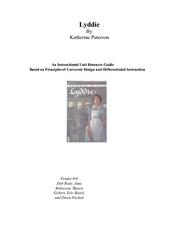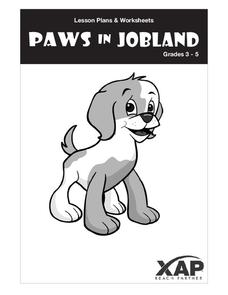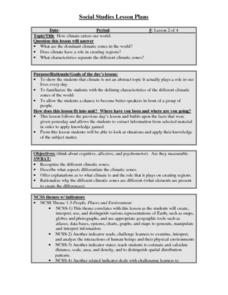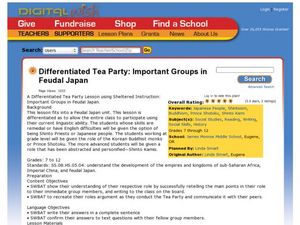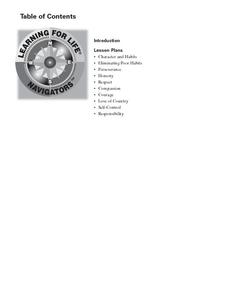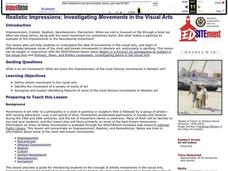BrainPOP
Latitude and Longitude Differentiated Lesson Plan
Scholars warm-up their map skills with a discussion using location words to describe familiar places. An engaging video informs class members about latitude and longitude. Three leveled activities extend the learning experience for...
Curated OER
Arkansas is Our State: Differentiating Between a State and a Country
An ambitious geography lesson is geared toward kindergartners. They discover what the differences are between states and countries. They look at maps of Arkansas, and learn what the shapes and lines mean. Additionally, they create a...
Curriculum Development Institute
Olympic Games
The Olympic Games are the subject of a differentiated lesson for a middle school classroom. Activities include researching the events in the ancient games and comparing them to events in the modern Olympics, gathering acts about why...
National Endowment for the Humanities
People and Places in the North and South
North and South: two opposite directions and two opposite economic and social systems in time of the Civil War. Pupils peruse census websites and primary source photographs to understand what life was like for the everyday person before...
Curated OER
Lyddie: An Instructional Unit Resource Guide
Katherine Paterson’s young adult novel Lyddie is the foundation of a differentiated instruction unit that not only explores the rise of industrialization and labor but women’s rights issues as well. After learners read the novel, they...
iCivics
Propaganda: What’s the Message?
As class members progress through eight fully prepared learning stations, they will identify how bias is present in persuasive media, as well as differentiate among types of propaganda techniques like bandwagon propaganda and the use of...
Curated OER
Names and Places
Students explore where jobs are done. In this careers and geography lesson, students locate places in Canada on a map and list jobs that are done in their area of Canada. Lesson includes extension and differentiation ideas.
New York City Department of Education
Project Based Learning
After reviewing the information included in this resource, you will be an expert in both the definition of project-based learning and how to implement it with your class. Discover and explore thorough explanations, detailed examples, and...
Heritage Foundation
The Senate
Do your learners struggle to understand the differences between the Senate and the House of Representatives? Help them develop an understanding of how the US Constitution's clauses affect the Senate's operations. A high-quality social...
Curated OER
Biological Relationships
Create a written document to show knowledge of producers, consumers, decomposers, and symbiotic relationships. To investigate food consumption, your classes will differentiate between types of symbiosis and explain examples of each.
National Endowment for the Humanities
George Washington: The Precedent President
Everyone knows that George Washington was the first president, but do your scholars know why that was so important? The lesson plan, the third in a sequence of three, allows learners to understand how George Washington set a precedent...
National Endowment for the Humanities
How to Win a World War
High schoolers are have begun to learn the art of diplomacy with each other, but do they understand how diplomacy works at a global level? The second in a series of four lessons, guides scholars in evaluating primary sources. The why...
Curated OER
How climate enters our world
Students recognize the different climatic zones. They describe what aspects differentiate the climatic zones. Students offer explanations as to what climate is and the role that it plays on creating regions. They rationalize why the...
Curated OER
Social Studies Wonders: An Exploration
Help middle schoolers conduct Internet research and develop a working definition for the discipline of social studies. From a list of websites, they develop classification skills and differentiate between primary and secondary sources....
Curated OER
Differentiated Tea Party: Important Groups in Feudal Japan
Students research the different groups in Feudal Japan. In this Japanese people instructional activity, students are broken into different groups representing the different roles in Japan. They research their group and have a "tea party"...
Curated OER
A Differentiated Way through Think Dots
Students examine reasons that led people to explore, identify "West" as defined following Revolutionary War, explain importance of finding natural resources, develop time line of dates and events leading up to Lewis and Clark Expedition,...
Curated OER
A Vacation Expedition: Universal Design and Differentiated Instruction Lesson
Students plan a vacation to either a mountain, deep-sea location, rainforest or to the moon. In this vacation planning lesson, students research information about the location of their choice. They watch video clips on the SMARTBoard,...
Curated OER
Chapter 25: Monopolistic Competition and Oligopoly
Poring over the details and characteristics of monopolistic and oligopoly systems, these slides include charts, graphs, and key terms to help viewers truly grasp the concepts behind each market model. From budding economists to...
Learning for Life
Character and Habits
Part of growing up is differentiating between good and bad habits; developing the positive and eliminating the negative. This resource on life skills can be adapted to almost any age group. Class members participate in multiple...
Curated OER
Realistic Impressions: Investigating Movements in the Visual Arts
Young scholars explore the idea of movements in the visual arts and differentiate between some of the most well known movements in Western art. The lesson focuses on what makes a painting an example of a particular movement.
Curated OER
Math: The Cathedral Project
Second graders take a field trip to a nearby church or other historical building and examine it from a mathematical perspective. In groups, they calculate the seating capacity, describe the window patterns, differentiate types of...
Curated OER
Forty Acres? The Question of Land at the War's End
Should land be redistributed to former slaves after the Civil War? This essential question guides a lesson on the Reconstruction Era, as learners analyze primary sources (linked), recording responses on a worksheet (linked). To model the...
Curated OER
The Settlement of New England
A thorough exploration of the Puritan Migration and settlement of Plymouth, this presentation is sure to engage your young historians with its clear maps and historical documents. The presentation differentiates the philosophies of...
Curated OER
The Northern Renaissance
Differentiating between Northen European art and Italian art, these slides detail the intricacies of art during the Renaissance. The presentation features Flemish, French, German, and English art, as well as the art of Austria, Spain,...
Other popular searches
- Differential Equations
- Differential Rotation
- Differential Heating
- Differential Calculus
- Differential Correction
- Differential Leveling
- Math Differential Equations
- Differential Operators
- Differential Instruction
- Calculus Differentials
- Differential Extrema
- Differential Aptitude






